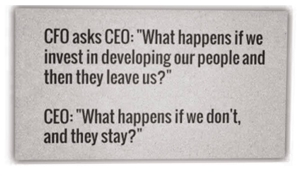 CFO asks CEO: "What happens if we invest in developing our people and then they leave us?"
CFO asks CEO: "What happens if we invest in developing our people and then they leave us?"CEO: "What happens if we don't, and they stay?"
I really LOVE this "fictional" exchange. It drives a stake right through one of the arguments against training and developing your salespeople.
 We speak with General Managers, Director of Sales, and Sales Managers all the time who know that they need to do "something" to get their sales organization heading in the right direction. They've tried all of the "ways" that you are supposed to help an organization grow. They've hired new salespeople, new managers, updated presentation decks, created new sales packages, and some have even tried to "train" their people.
We speak with General Managers, Director of Sales, and Sales Managers all the time who know that they need to do "something" to get their sales organization heading in the right direction. They've tried all of the "ways" that you are supposed to help an organization grow. They've hired new salespeople, new managers, updated presentation decks, created new sales packages, and some have even tried to "train" their people.But, if they have taken the step to contact us, it probably hasn't worked.
The reason that most of it doesn't work is that they are too busy working "in" their business, instead of working "on" their business. They are stuck in the world of URGENT and not IMPORTANT. Well, the same can be said for their salespeople. So, often, we hear how reps are so busy, but aren't productive. They are stuck in the vicious cycle of urgent client needs, instead of important ones. They are also usually focusing on the wrong clients.
This is why every organization needs/must invest time (and sometimes money) on training their salespeople (and managers). If they don't, they'll never get off the hamster wheel of death.
Here are 3 Ways to Improve Your Sales Team with Sales Training:
1. Focus on the "Right" Accounts
No matter what I speak with, they all tell me how busy they are these days. When I start asking questions about what is keeping them so busy, it's always the same answer. I have all of these accounts that are so demanding. They always have a problem that is so urgent. When I ask about how much they are spending...it's usually a small account. Over the years, we've all figured out that large accounts and small accounts have the same number of problems. So, why do we even bother with small accounts? If they are going to be a headache, at least make sure that it's worth it. That's why we recommend that salespeople focus on Key Accounts, which are accounts represent the top 75% of an organizations revenue and Target Accounts that have the potential to be Key Accounts. Great sales training starts here...
2. Go on Sales Call
What? We already go on sales calls. True, but what is your purpose of being on the call? Is it to close the deal, save the day, or learn how your sales reps actually perform in the field? You know it's not the latter, and that's the problem. Spend a full or half day in the field with one rep every week, so that you can watch and listen, so that you can give feedback. That is when real-world training not only takes place but is super impactful.
3. Training Snacks
Training doesn't have to be a full-day, in-the-office production. In fact, training should be a regular part of your daily and weekly routine. We recommend training snacks. Those are small, bite-sized training nuggets that you regularly provide to your team. Look for ways to train your staff in your individual meetings, sales calls, and sales meetings. Make them delicious and nutritious.
It's vital that sales organizations invest in training their salespeople (and managers). Don't miss out on the opportunity to develop great people and help them (and the organization) improve sales performance.



